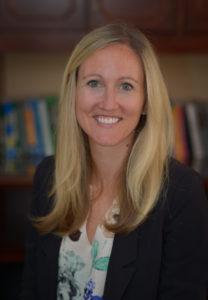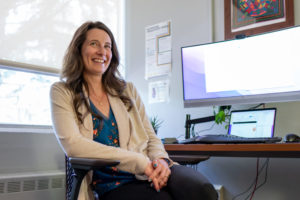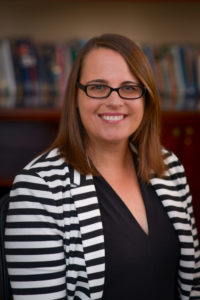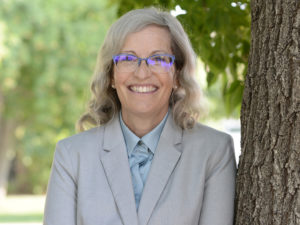The research mission of the Colorado State University School of Social Work is to promote and protect health as a human right across the lifespan through critically engaged and community-oriented research that amplifies traditionally marginalized voices.
Through their research, our faculty are tirelessly addressing the Grand Challenges of Social Work. They are honing practice, impacting policy, and improving lives.
Below are four highlights of research published by CSU School of Social Work faculty from this academic year.
Jamie Yoder
Developing a trauma focused cognitive behavioral therapy application for adolescents with problematic sexual behaviors: a conceptual framework
Jamie Yoder is leading the way on a new study that aims to improve public safety and reduce justice-involvement among youth by developing an integrated trauma-focused cognitive behavioral therapy for adolescents with problematic sexual behaviors (PSB).
“While research shows that youth who exhibit problematic sexual behavior have high rates of adversity, their own trauma histories are often ignored when receiving court-mandated rehabilitation and therapeutic services, which are focused on reducing the risk of reoffending,” Yoder said. “This is despite the strong evidence that adverse childhood experiences are often the most salient risk factors for the onset and course of PSB.”
Although rates of sexual re-offense rates with PSB are low, the rates of non-sexual recidivism are considerably higher, according to Yoder.
“Almost half of known youth have reoffended non-sexually, requiring the development, implementation, and testing of therapeutic interventions responsive to the indicated risks and unmet needs of adolescents who have engaged in PSB and their families,” Yoder said.
Currently, there are no empirically supported interventions designed specifically to address PSB with trauma histories, according to the abstract of Yoder’s recently published paper.
“By ignoring the core drivers of offending such as trauma, treatment programs lack robust attention to factors that contribute to stopping PSB,” Yoder said.
Yoder and Melissa Grady (Catholic University) are working with Esther Deblinger and Anthony Mannarino, developers of trauma-focused cognitive behavioral therapy (TF-CBT), to apply their empirically sound approach specifically to youth with PSB.
“As a part of our pilot phase, we are partnering with a training team at the University of Oklahoma to deliver TF-CBT to clinicians. This phase will test the feasibility and acceptability of the approach,” Yoder said. “We will take this pilot data and move it into a larger NIMH grant to fund a hybrid implementation effectiveness study of TF-CBT for PSB.”
Yoder hopes that the impact of this research will be three-fold. “Ultimately, our hope is that this approach can enhance public safety, reduce justice-involvement among youth with PSB, and operate as a mechanism of sexual violence prevention,” she said.
“Building prevention approaches that integrate empirically known risk factors can help us achieve our goal of preventing and reducing incidents of sexual violence,” Yoder said.
Tiffany Jones
University–School Partnerships: Successes and Challenges in Designing and Implementing Strategies to Promote Racial Equity
After engaging in a research-practice partnership with two schools in the Pacific Northwest, Tiffany Jones, assistant professor, took a step back to reflect on the successes and challenges of those partnerships (one of which was interrupted by the pandemic) when working towards racial justice in schools.
“We had many successes but also many barriers,” Jones said. “We learned a lot about the processes that that facilitate and hinder racial justice work in schools.”
In their abstract, Jones and her co-authors state how research practice partnerships play an important role in “critically examining racial disparities in schools, as well as supporting the immediate adoption of practice improvement.”
If quotes from students about their experiences of racism were used in the conversation “school staff were more likely to engage in critical dialogue and take students’ experiences seriously,” she said.
“When we were able to have open conversations about race, school leaders were open to trying new things to address racial disparities in schools,” Jones said. “When there were barriers to having these critical discussions, we learned about how this got in the way of moving forward. Power was often in play when folks were resistant to talking about racism and how it impacted students.”
Jones hopes that her research will help provide a structured space for schools to have the critical dialogues necessary for racial justice work and provides reason for more student voice to be integrated into planning processes.
“For researchers doing racial justice work in schools, we hope that by writing about success and challenges can help other researchers who are engaged in research practice partnerships aimed towards improving racial equity,” she said.
“Often, we read in academic articles only about the successes. By sharing out struggles and lessons learned, in addition to our successes, we hope other researchers can deepen their racial justice work with schools.”
Anne Williford 
The role of colorblind racism and white fragility in maintaining racist bullying in middle school
Anne Williford, associate professor, and Jones are diving into how colorblind racism and white fragility impact bullying experienced by racially minoritized students in middle schools.
“We learned that racist bullying was a common experience among students of color in this school, and the actions and behaviors of staff and other students contributed to its presence in the school,” Williford said.
Data from the five focus groups and one interview found that white students and staff commonly displayed white fragility and colorblind racism in their statements, according to the researchers.
“White fragility and colorblind racism led white staff and students to downplay, dismiss, or ignore acts of racist bullying, which in turn contributed to its persistence in the school,” Williford said.
Williford and Jones hope that this study will encourage school administrators and staff to properly train teachers and staff to effectively address bullying motivated by a student’s racial or ethnic background.
“Our findings suggest that identifying implicit attitudes and biases that are related to white fragility and colorblind racism may be an important approach for preparing white staff and students to see race as a salient factor in the lives or racially and ethnically minoritized students, and this a factor that may motivate racist bullying,” Williford said. “In doing so, staff will be better prepared to recognize and effectively address acts of racist bullying.”
Jen Currin-McCulloch
We need mutual aid too: group work instructors helping each other navigate online teaching
During the onset of the COVID-19 pandemic, Jen Currin-McCulloch, assistant professor, and other social work educators and researchers explored how mutual aid can benefit educators as they navigate unprecedented teaching environments.
“As a new faculty member in the 2019-2020 academic year, I was not trained or prepared for how to transition my teaching to a fully virtual format once the pandemic started,” said Currin-McCulloch. “I reached out to find a community of instructors who also were new to teaching online. We formed a group of 12 from around the globe who met weekly to discuss the challenges and triumphs of our virtual classrooms.”
The group shared practical examples, activities, and teaching practices to create student belonging, better navigate mental health concerns, and create engagement in a time when everyone was experiencing their own hardships due to the pandemic, according to Currin-McCulloch.
“The team also taught me how to best evaluate my online teaching and to make changes to amplify students’ understanding of topics,” she said.
Currin-McCulloch hopes this publication will “create opportunities for social work educators to develop team-based learning approaches to address social and political crises and foster a vulnerable space to ask for guidance and share about academic struggles in and outside of the classroom.”
The School of Social Work is part of CSU’s College of Health and Human Sciences.